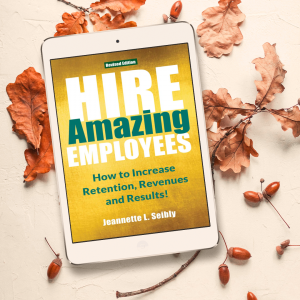
Many job seekers love to share their stories about their horrible experiences when applying for jobs. Or, thankfully, share about losing out on a job due to the hiring boss’s poor interviewing behavior.
Stories hiring bosses love to share include nixing a person because they didn’t carry a pen to not hiring candidates that failed to answer non-job-related questions with responses they wanted to hear (e.g., most recent books read or movies seen).
As a hiring boss, you may not be aware of your biases. But they exist, many times unconsciously. And cost you time, money, and sleepless nights. (Example: Making your decision in 4 to 15 minutes of meeting people whether or not to hire them.)
Here’s a great way to determine if your company’s hiring and selection process needs help: use secret job seekers. (Similar to retailers using secret shoppers.)
How to do it: Secretly, without letting hiring bosses know, have friends, trusted employees, and business associates apply for open positions. Have them change their names on their resumes; use fictitious company names, job titles, and educational degrees; and provide pay-as-you-talk cell phones.
Most likely flaws you’ll uncover:
- Difficulties using your ATS (applicant tracking system)
- Inconsistencies of questions asked during interviews
- Not using qualified job fit assessments (Note: Not all assessments are created equal and most do not comply with Department of Labor guidelines for pre-employment use).
The surprises (or maybe not … but now you have factual data required to make needed changes): you will discover the costly mischief about your company’s hiring practices and what is causing the company’s bad reputation.
Common issues will include:
- Promises made during interviews and not kept when making job offers
- Having too many interviewers or having team interviews with people not on the same page
- Job descriptions are too long and uninspiring
- Job postings are boring
- Links and QR Codes don’t work
- Inconsistencies when hiring managers conduct interviews (e.g., asking inappropriate questions or not asking the same structured questions of candidates for the same job)
- Poor due diligence practices due to not thoroughly checking the backgrounds of all candidates
The key to fixing these issues is to design a strategic job fit selection process and use the best tools (e.g., ATS, structured interview formats, qualified job fit and core value assessments, and consistent due diligence practices). Note: Guidance on how to select the best tools can be found in Hire Amazing Employees: How to Increase Retention, Revenues, and Results.
This is critical and often overlooked! Conduct training programs for all hiring bosses, and provide intra-company access to all required tools and procedures to ensure consistent hiring practices. Also, have a key executive hold all hiring bosses accountable for following all the policies and procedures in the spirit of hiring the right person for the right job the first time!
Training will reduce costly hiring problems and ensure the best hiring practices.
The results? When you implement this secret job seeker program, you will attract and hire better candidates that stop ghosting you! As a result, your company will thrive by increasing retention, revenues, and results. And you may become the best employer in 2023.
©Jeannette Seibly 2023 All Rights Reserved
 Jeannette Seibly is The Leadership Results Coach. She has over 30 years of award-winning international experience as an executive consultant, speaker, and business author. Her clients surpass the norm by working through sticky situations and challenging relationships to become positive influencers. Contact Jeannette for a confidential discussion.
Jeannette Seibly is The Leadership Results Coach. She has over 30 years of award-winning international experience as an executive consultant, speaker, and business author. Her clients surpass the norm by working through sticky situations and challenging relationships to become positive influencers. Contact Jeannette for a confidential discussion.
A note from Jeannette about testing your hiring practices to eliminate costly (and avoidable) issues: It makes good business sense to ensure your company uses consistent, reliable, and valid hiring practices. Contact me to talk through hiring challenges and how to overcome them. It’ll save you time, money, and your customers!
 This week’s PODCAST: Listen to Grow your side hustle into a full-time job with my guest, Bobby Crew on The Entrepreneurial Leader.
This week’s PODCAST: Listen to Grow your side hustle into a full-time job with my guest, Bobby Crew on The Entrepreneurial Leader.
NOTE: Do you want to win? All leaders who are winners have coaches! I love coaching leaders and have for over 30 years! Contact me if you want an in-depth, one-on-one hour over 13 weeks. When you have a coach, it’ll speeds up your ability to influence others, hire the right people, and coach your team for unprecedented results.


 This week’s PODCAST: Listen to the Mastering Communication Skills with my guest, Meredith Bell, on
This week’s PODCAST: Listen to the Mastering Communication Skills with my guest, Meredith Bell, on 

 Hiring the wrong person for an executive or critical position jeopardizes your company. However, this can be preventable when using a strategic selection system. Get essential hiring and selection tips by grabbing the Amazon International Best-Selling Book,
Hiring the wrong person for an executive or critical position jeopardizes your company. However, this can be preventable when using a strategic selection system. Get essential hiring and selection tips by grabbing the Amazon International Best-Selling Book, 

 Jeannette Seibly is The Leadership Results Coach. She has been an award-winning international executive and family business management consultant, keynote speaker, and author for over 29 years. Her focus is to guide leaders to make a positive difference. Feel stuck moving your team forward? Want straightforward counsel on how to do it? Let’s chat!
Jeannette Seibly is The Leadership Results Coach. She has been an award-winning international executive and family business management consultant, keynote speaker, and author for over 29 years. Her focus is to guide leaders to make a positive difference. Feel stuck moving your team forward? Want straightforward counsel on how to do it? Let’s chat! 


